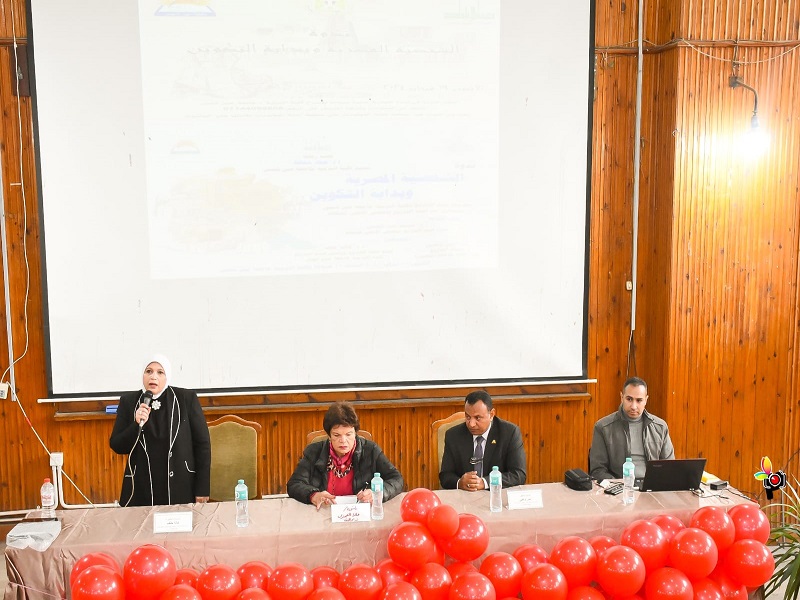A symposium on the Egyptian Personality and the Beginning of Formation at the Faculty of Education
Under the patronage of Prof. Safaa Shehata, Acting Dean of the Faculty of Education, Ain Shams University, The Department of History organized a symposium entitled “The Egyptian Personality and the Beginning of Formation,” in cooperation with the History and Antiquities Committee of the Supreme Council of Culture.
This came in the presence of Prof. Ahmed Ragab, Vice President of Cairo University, and Prof. Ola Al-Agizy, former Dean of the Faculty of Archeology, Cairo University, and a number of members of the History Committee of the Supreme Council of Culture: Prof. Gamal Shakra, former rapporteur of the History Committee, Prof. Hala Khalaf, Head of the History Department, Prof. Ayman Fouad, Prof. Gamal Abdel Rahim, Prof. Ahmed El-Sherbiny, Prof. Nader Al-Hasanein and a large number of members of the Department of History, Prof. Mohamed Hamed, Director of the Quality Unit at the Faculty, Dr. Odeh Hassan Abu Sheikha, Prof. Anwar Zanati, Dr. Mahmoud Abdel Kader, and a large number of the assistant staff in the Department of History, Faculty of Education, Ain Shams University.
Prof. Safaa Shehata held the symposium, pointing out its importance for college students in general and students of the College of Education in particular, as they are the teachers of tomorrow and it is their responsibility to instill everything that is beautiful in the Egyptian personality and work to strengthen it to face the challenges. The symposium was moderated by Prof. Ola Al-Agizi, who welcomed the guests.
Prof. Ayman Wahba, Professor of Egyptian Antiquities at Mansoura University, guest of the symposium, talked about the site and the emergence of ancient Egyptian civilization. He explained that the Nile is the maker of Egyptian civilization and the artery of its survival, and what are the names of ancient Egypt and their national connotations. He explained the broad outlines of ancient Egyptian history from prehistoric times to the pre-dynastic period until The fall of the Roman Empire. He also explained the fabric of ancient Egyptian society and what were the most important social classes. Then he moved on to clarifying the nature of the ancient Egyptians and their morals in life, and explained that Maat was the motivation for the personality of the ancient Egyptian.
He concluded his talk about the achievements of Egyptian civilization and its uniqueness in many fields, and concluded his talk with the most important influential figures in the history of Egypt.
Prof. Hala Khalaf, said that the symposium comes within the framework of a series of educational seminars with the aim of emphasizing the determinants of the Egyptian personality, its origins, the values that govern it, its strength, its characteristics, and the challenges it faces. Then, she talked about the status of the ancient Egyptian woman, and explained that the woman in the ancient Egyptian civilization enjoyed a high status that no other woman had. A woman in other ancient civilizations of the world, and that women had an important and influential role in society as a queen, businesswoman, and housewife, and their role was no less than that of men, and that the role of women in life was represented in two things: the first was her private life at home, and the second was her public life in society, which is A man's companion on the journey of life, and his right-hand man in performing his work. She explained that many ancient and modern sources talked about the status of the ancient Egyptian woman and her enjoyment of all her rights.
At the closing of the meeting, Prof. Safaa Shehata presented the faculty shield to the Rapporteur of the History Committee, Prof. Mohamed Abdel Ghani in appreciation of his efforts.


.svg)




